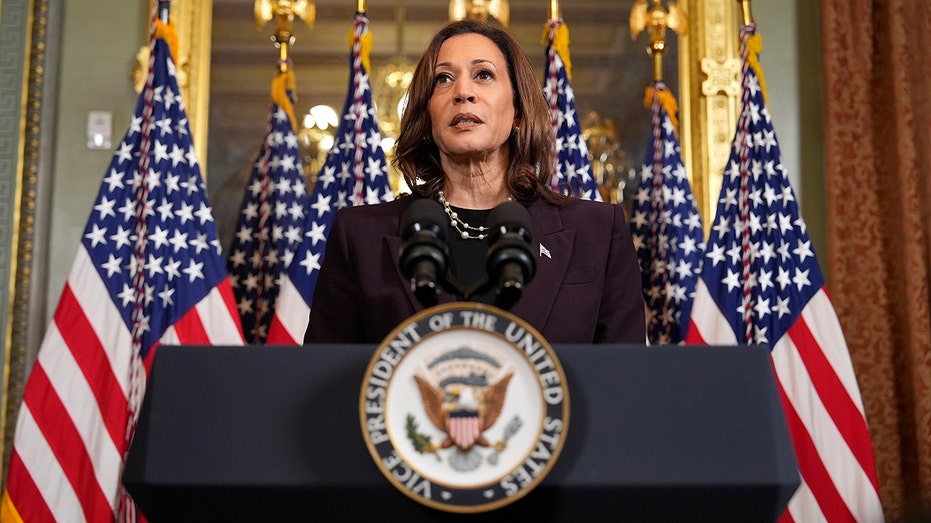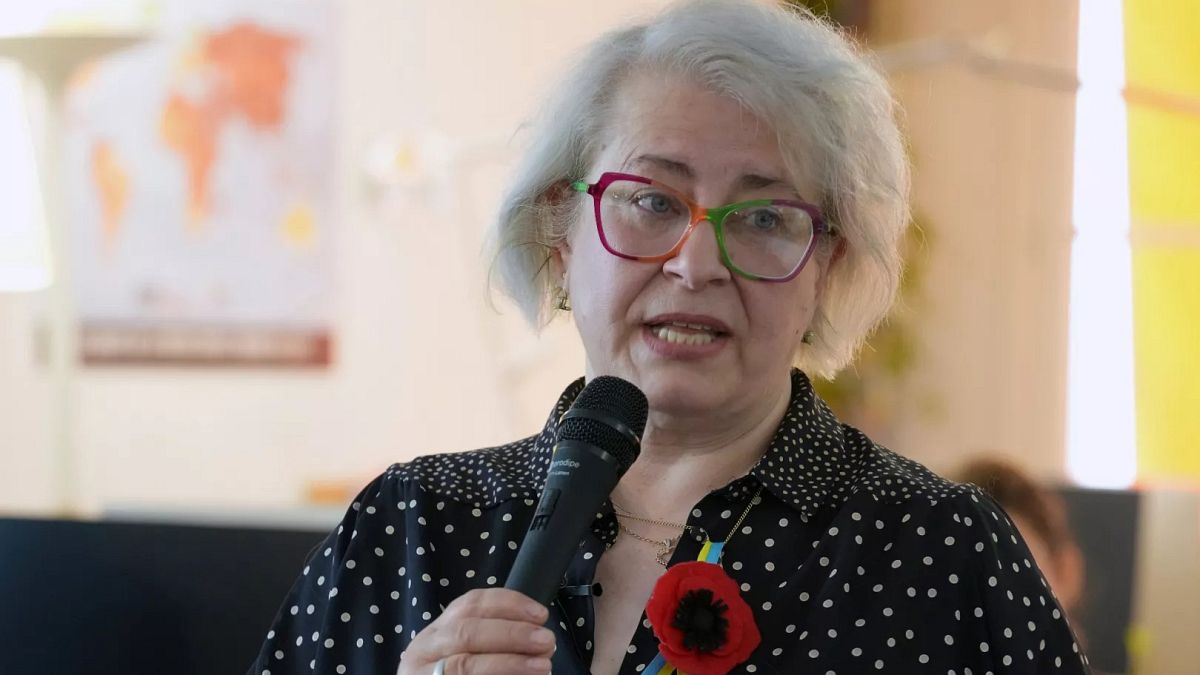Kamala Harris' foreign policy chops questioned: What has she done, where has she been?
With Kamala Harris the most likely Democratic nominee to take on Donald Trump many are questioning whether she has the credentials to take on top adversaries like Russia and China.

Scrutiny over Vice President Kamala Harris’ ability to lead the nation took center stage after she became the most likely challenger to take on Republican nominee Donald Trump in the race for the White House last week.
One question that remains on the minds of top security experts is whether she has what it takes to counter U.S. adversaries?
U.S. foreign policy has become a leading issue in this presidential election as wars in Gaza and Ukraine continue to not only be hot-button issues for American voters but remain top concerns to security experts eyeing geopolitical rivals like Russia and China.
Vice President Harris has tended to play a back seat role to President Biden when it comes to most U.S. foreign policy issues, as is typical with any vice president, but her handling of the U.S. immigration crisis has drawn condemnation from Republicans in Congress.
HOW VICE PRESIDENT KAMALA HARRIS GOT STARTED IN POLITICS
In 2021, Harris was dubbed the "border czar" by members of the GOP, and she has been repeatedly referred to as such by media outlets.
But Harris, who traveled to Guatemala in 2021 and then Honduras in 2022, was reportedly never tasked with stopping border crossings, a priority that falls under Homeland Secretary Alejandro Mayorkas’ purview. Harris was tasked with countering the root causes of mass migration from Central America's Northern Triangle — Guatemala, Honduras and El Salvador.
Harris issued one of her strongest messages against mass migration during her 2021 trip when she said the Biden administration was committed to helping Guatemalans find "hope at home."
"I want to be clear to folks in this region who are thinking about making that dangerous trek to the United States-Mexico border," she said. "Do not come. Do not come."
But migration across the southern border under the Biden administration drastically ramped up, spiking in 2023 before slowing down in 2024, and the issue remained a constant source of frustration among the GOP.
"She made no difference by their own objective measures," Robert Greenway, director of the Allison Center for National Defense at The Heritage Foundation, told Fox News Digital. "She did nothing to change root causes in Latin America. She made, therefore, no impact on the immigration crisis that still remains a top issue for voters."
Harris’ approach to addressing mass migration has many wondering about her ability to cope with other geopolitical matters.
THE MEDIA'S SUDDEN REJECTION OF KAMALA HARRIS' 'BORDER CZAR' LABEL
Top officials in the Biden administration argue Harris has been intimately involved in major geopolitical issues like the war in Ukraine, and Secretary of State Antony Blinken said he believes foreign policy is Harris' "forte."
"I’ve seen her not only around the world, but I’ve seen her on the most critical foreign policy questions of our time in the Situation Room at the White House, in the Oval Office with the President," Blinken told reporters last week. "And my observation is she’s very strong, very effective and [a] deeply respected voice for our country around the world."
Last month, Harris traveled to Switzerland for the Summit on Peace in Ukraine, where she renewed support for Ukrainian President Vladimir Zelenskyy and U.S. commitment to counter Russia.
"I first met President Zelenskyy in February of 2022, just five days before Russia invaded Ukraine, an outrageous attempt to subjugate a free people and an attempt to wipe a sovereign state off the map," she said during the summit.
"America stands with Ukraine not out of charity but because it is in our strategic interest," she added. "It is one of our defining missions to uphold the international rules-based order to defend it, strengthen it and promote it. And, no doubt, it must be a priority for us all."
Harris has traveled to Europe at least six times since entering the White House, including the U.K., Germany, Poland, Romania and France, where she has repeatedly renewed U.S. support for Ukraine and Washington’s commitment to NATO.
Her stance on NATO and Ukraine is unlikely to veer from President Biden’s should she win the White House in November, though where she may differ from the current administration is her position on Israel.
The war in Gaza has become the most divisive political issue within the Democratic Party, and Harris has been vocal in her condemnation of it.
After meeting with Israeli Prime Minister Benjamin Netanyahu on July 25, Harris said they had a "frank and constructive meeting" during which she "reiterated her longstanding and unwavering commitment to the security of the State of Israel."
"I’ve said it many times, but it bears repeating: Israel has a right to defend itself, and how it does so matters," she said. "I also expressed with the prime minister my serious concern about the scale of human suffering in Gaza, including the death of far too many innocent civilians. And I made clear my serious concern about the dire humanitarian situation there.
"We cannot allow ourselves to become numb to the suffering. And I will not be silent."
Despite Harris' assurances that she will "always ensure that Israel is able to defend itself," Republicans remain skeptical when it comes to her position on Israeli security.
In an interview with Fox News, former Secretary of State Mike Pompeo accused Harris of speaking to pro-Hamas and pro-Palestinian constituents as well as "implicitly messaging Hamas leadership."
But Blinken pushed back on criticisms over Harris' position when it comes to the war in Gaza and said she is "deeply engaged in the Middle East, in trying to find a peaceful path forward."
"What I’ve observed is someone who asks time and again penetrating questions, who cuts to the chase and is intensely focused on the interests of the American people," he added.
NETANYAHU REPORTEDLY UPSET WITH HARRIS OVER VP’S ISRAEL REMARKS AS WHITE HOUSE PUSHES BACK
The meeting last week reportedly marked only the second time Harris has met with Netanyahu. The first occurred in 2017 during her time as a California senator.
Greenway, who also sat as the deputy assistant to the president and senior director for Middle Eastern and North African Affairs for the White House's National Security Council during the Trump administration, said he expects Harris will be "more sensitive to the Palestinian side of the equation and their approach to the resolution of the conflict."
Harris' position when it comes to Iran – the chief adversary in the Middle East given its threat of nuclear development and its direct involvement in backing Hamas, Hezebollah and Houthi rebels against Israel, as well as supplying drones to Russia for its war in Ukraine – is not expected to diverge from Biden's.
The vice president has traveled to the Middle East twice while sitting as second in command, though both trips were to the United Arab Emirates, including for a U.N. climate conference in 2023 and in 2022 to provide condolences on behalf of the Biden administration on the passing of former UAE President Sheikh Khalifa bin Zayed Al Nahyan.
In March 2023, Harris traveled to Ghana, Tanzania and Zambia to meet with government leaders and business officials as the U.S. looked to shore up security and economic interests across Africa.
The White House said Harris’ trip focused on efforts to advance the "digital economy, support climate adaptation and resilience and strengthen business ties and investment."
She also addressed concerns about food insecurity, which has become a major issue for many African nations due to Russia’s war in Ukraine.
Harris’ trip signaled the Biden administration's attempts to expand geopolitical ties on the continent, particularly as Russia and China look to bolster relations across Africa.
Secretary of Defense Lloyd Austin said his confidence in Harris' abilities to lead abroad stems from the "vital" role she has played during top defense meetings.
"She's been a vital asset to the overall team throughout this. That's what I know from sitting in a room with her over 3½ years," he told reporters.
Arguably the biggest mishap by the Biden administration was the chaotic withdrawal from Afghanistan that resulted in the death of 13 U.S. soldiers.
While Biden has taken the brunt of the criticism, Harris said in a 2021 interview with CNN that she was the "last" person in the room with the president before he made the decision to pull all U.S. troops from Afghanistan, an admission that could spell trouble for the vice president on the campaign trail.
While U.S. involvement with the Taliban-run nation has significantly diminished, another nation in Asia, China, remains a top issue this election cycle.
Harris has traveled to Asia several times during her time as vice president, including trips to Japan, South Korea, Indonesia, Thailand, the Philippines, Singapore and Vietnam.
During her first trip to the continent as vice president, Harris stopped in Indonesia, where she addressed issues concerning climate change, infrastructure and economic growth. But she also hit on maritime security and "efforts to uphold and strengthen international rules and norms in the region," a message that was directed at Beijing.
Harris has not yet made the trek to China, though she did briefly meet with Chinese President Xi Jinping during the Asia-Pacific Economic Cooperation (APEC) summit in Bangkok in 2022.
The vice president has engaged in tough talk on China, accusing Beijing of "bullying" in the South China Sea and taking a "de-risking" approach to further separate the U.S. from China.
"It’s not about pulling out, but it is about ensuring that we are protecting American interests, and that we are a leader in terms of the rules of the road, as opposed to following others’ rules," she told CBS in 2023.
"We absolutely are prepared to, and engaged in, what is necessary to compete."
But Greenway doesn't think it is likely Harris will take a tougher approach to Beijing than Biden has.
"[China's] aggressively applying leverage across the board against our partners and threatening to accelerate their military expansion," Greenway said. "They've announced that they're going to accelerate their already significant production of nuclear weapons. And they're on track to be prepared to blockade or invade Taiwan for reunification purposes by 2027."
Greenway pointed out that these concerns would exist no matter who takes up the top job following the November election. But he also argued that "all of these dangers don't seem to have abated" under the Biden administration.
"I don't think that we're likely to expect it to happen under the Harris administration," he added.
Austin told reporters Harris has been a "key player" when it comes to enacting U.S. geopolitical aims.
"She understands national security, international affairs," he said. "She's represented this country in the international arena on the international stage a number of times and done so in a very, very professional and effective manner."
What's Your Reaction?
















